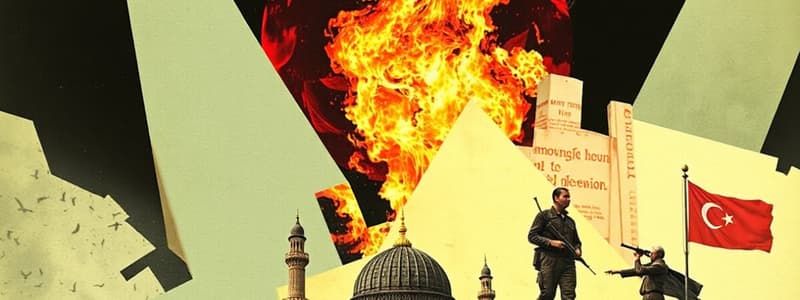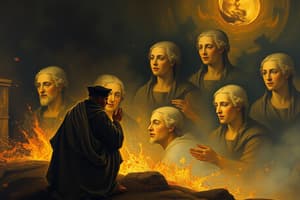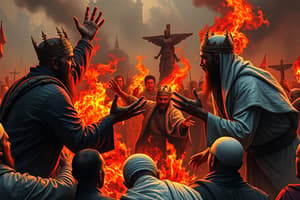Podcast
Questions and Answers
What primarily motivates acts of religious violence?
What primarily motivates acts of religious violence?
- Political power exclusively
- Economic interests
- Personal disagreements
- Religious beliefs and ideologies (correct)
Religious violence is unique to specific faiths.
Religious violence is unique to specific faiths.
False (B)
Name one example of religious violence mentioned in the details.
Name one example of religious violence mentioned in the details.
The Crusades
Terrorism is the use of violence by _______ actors to achieve political, ideological, or religious goals.
Terrorism is the use of violence by _______ actors to achieve political, ideological, or religious goals.
Match the following terms with their definitions:
Match the following terms with their definitions:
What is a key characteristic of religious terrorism?
What is a key characteristic of religious terrorism?
Fundamentalism often embraces modernity and pluralism.
Fundamentalism often embraces modernity and pluralism.
What often fuels religious violence according to the connections mentioned?
What often fuels religious violence according to the connections mentioned?
What is the definition of soft power in the context of religion?
What is the definition of soft power in the context of religion?
Fundamentalist ideologies are inherently violent.
Fundamentalist ideologies are inherently violent.
Name a fundamentalist movement in Christianity that opposes abortion.
Name a fundamentalist movement in Christianity that opposes abortion.
The rise of ______ in Saudi Arabia is an example of a fundamentalist interpretation of Islam.
The rise of ______ in Saudi Arabia is an example of a fundamentalist interpretation of Islam.
Match the following concepts with their definitions:
Match the following concepts with their definitions:
Which of the following is an example of religious soft power?
Which of the following is an example of religious soft power?
The Vatican's encyclical Laudato Si’ focuses on environmental stewardship.
The Vatican's encyclical Laudato Si’ focuses on environmental stewardship.
According to Samuel Huntington, what will future global conflicts be primarily driven by?
According to Samuel Huntington, what will future global conflicts be primarily driven by?
The framing of the 'War on Terror' illustrates a clash between Western liberal values and ______.
The framing of the 'War on Terror' illustrates a clash between Western liberal values and ______.
What is a major criticism of Huntington's thesis on the clash of civilizations?
What is a major criticism of Huntington's thesis on the clash of civilizations?
Flashcards
Fundamentalism
Fundamentalism
A strict interpretation and adherence to foundational religious texts.
Wahhabism
Wahhabism
A fundamentalist interpretation of Islam originating in Saudi Arabia.
Religious Violence
Religious Violence
Violence justified by religious ideologies or beliefs.
Deprivatization
Deprivatization
Signup and view all the flashcards
Soft Power
Soft Power
Signup and view all the flashcards
Religious Soft Power
Religious Soft Power
Signup and view all the flashcards
Clash of Civilizations
Clash of Civilizations
Signup and view all the flashcards
Samuel Huntington
Samuel Huntington
Signup and view all the flashcards
Religious Nationalism
Religious Nationalism
Signup and view all the flashcards
Global Ethics
Global Ethics
Signup and view all the flashcards
Terrorism
Terrorism
Signup and view all the flashcards
Religious Terrorism
Religious Terrorism
Signup and view all the flashcards
Context of Religious Violence
Context of Religious Violence
Signup and view all the flashcards
Connections of Terrorism
Connections of Terrorism
Signup and view all the flashcards
Examples of Religious Violence
Examples of Religious Violence
Signup and view all the flashcards
Fundamentalism Response
Fundamentalism Response
Signup and view all the flashcards
Study Notes
Religious Violence
- Religious violence involves aggressive actions motivated by religious beliefs, ideologies, or identities.
- It can manifest in warfare, terrorism, and communal violence, often tying conflict to religious frameworks.
- Religious violence isn't limited to any single faith and is frequently connected to broader social, political, or economic grievances.
- Examples include the Crusades and violence during the Bosnian War, where religious sites became targets.
- Religious violence often overlaps with terrorism, where non-state actors use it for political aims.
- Religious nationalism can intensify religious violence, linking conflict with sacred national identity.
Terrorism
- Terrorism is the use of violence by non-state actors to achieve political, ideological, or religious objectives.
- Religious terrorism utilizes faith-based justifications for violent acts.
- Religious terrorism differs from secular terrorism in its transcendental justification, as perpetrators see their actions as fulfilling divine will.
- Examples include Al-Qaeda's 9/11 attacks and anti-abortion violence in some contexts.
- Religious terrorism often originates from fundamentalist interpretations of faith.
- Terrorism can be framed within broader cultural-religious conflicts.
Fundamentalism
- Fundamentalism involves strict adherence to traditional religious doctrines, usually resistant to modernity and pluralism.
- It emphasizes a literal interpretation of religious texts and often seeks a return to perceived pure practices.
- Fundamentalist movements often respond to social change, globalization, or threats to religious identity.
- Fundamentalism is found across various religions, although not all fundamentalist movements are violent.
- Examples include Wahhabism and certain Christian fundamentalist movements in the U.S..
- Fundamentalist ideologies can justify violent acts, and fundamentalists frequently push for religion's public role.
Soft Power and Religion
- Soft power is influencing others through attraction, not coercion.
- In religion, soft power involves using faith-based values, narratives, and institutions to shape international relations and diplomacy.
- Religious soft power often uses moral authority, cultural influence, and interfaith dialogue.
- Examples include the Vatican's role in promoting peace and environmental stewardship and Saudi Arabia utilizing Islamic solidarity.
- Soft power demonstrates religion's influence on global politics outside traditional diplomacy.
- Religious soft power often aligns with universal ethical principles.
Clash of Civilizations
- Huntington's theory posits future conflicts will stem from cultural and religious differences instead of ideological or economic divides.
- The theory gained traction after the Cold War, particularly after 9/11, framing global politics as a struggle between secular liberal democracies and religiously motivated civilizations (e.g., Islam vs. the West).
- The "War on Terror" was sometimes presented as a clash between Western values and radical Islam.
- Cultural tensions between secular Europe and Muslim communities exemplify this theory.
- Religious nationalism and terrorism are often interpreted through the lens of civilizational clashes.
Studying That Suits You
Use AI to generate personalized quizzes and flashcards to suit your learning preferences.




